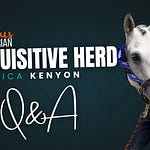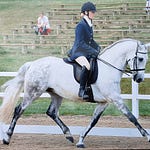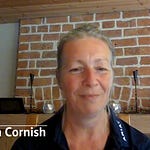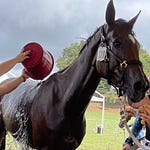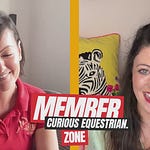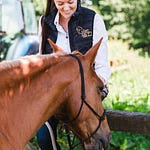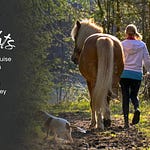We venture into the UK's first nature reserve to explore revolutionary approaches to understanding horses through the lens of their wild counterparts. We discover why everything we think we know about "difficult" horses might be wrong, and how the concept of choice transforms relationships between humans and equines.
This Week's Deep Dive
Guests: Bonnie Meeland, Equine Podiatrist and Learning Wild Co-founder; Dr Emily Keeson, Equine Behavioural Researcher and Learning Wild Co-founder
Key Topics:
The concept of "telos" and understanding the intrinsic nature of horses
Why wild horses are safer to work with than many domestic horses
How choice and communication transform horse-human relationships
Debunking myths about stallions and wild horse behaviour
The Big Takeaway
The most profound insight from this episode challenges everything we've been taught about "problem" horses. Bonnie's breakthrough moment came with an unhandled yearling who allowed her to trim his hooves while standing loose and unrestrained – simply because she had built trust first. This experience revealed that many behavioural issues in domestic horses aren't innate traits but adaptations to environments and handling that don't honour their true nature. When we strip away force and coercion, replacing them with genuine communication and choice, horses reveal themselves to be willing partners rather than animals that need to be controlled.
Three Things That Stood Out
1. "Telos" – The Hoarseness of a Horse Professor Bernard Rollin's concept of telos describes the intrinsic being of an animal – the hoarseness of a horse, the pigness of a pig. This foundational idea drives all of Learning Wild's work, focusing on who horses truly are rather than who we've been told they are. For equestrians, this means questioning whether our training methods align with horses' evolved nature as social, choice-making beings.
2. Wild Horses Are Safer Than "Difficult" Domestic Horses Bonnie's revelation that working with truly wild horses is often safer than working with domestic horses carrying trauma challenges our assumptions. Wild horses haven't learned defensive behaviours or shut down emotionally, they remain expressive and communicative. This suggests that many "dangerous" horses are actually expressing valid responses to poor handling rather than exhibiting inherent aggression.
3. The Power of Offering Choice Dr Keeson's research methodology of offering horses different coloured halters associated with different activities, grooming, play, or riding, and allowing them to choose or walk away, demonstrates how choice transforms relationships. When horses can say no, their yes becomes meaningful. This principle has profound implications for everything from daily handling to training programmes.
Deep Dive Analysis
Rethinking Wild vs Domestic Behaviour
The episode reveals a fundamental flaw in how we study equine behaviour. Most research examines horses in domestic environments without accounting for the countless variables affecting their natural expression. Dr Keeson's work at Wikem Fenn provides a rare opportunity to observe horses making completely free social, environmental, and reproductive choices – something almost impossible to study elsewhere.
What emerges is a picture radically different from the "flight animal" narrative we're often taught. Yes, horses have incredible flight capabilities, but their behaviour is shaped far more by their social nature than their flight instincts. The peaceful coexistence of multiple stallions with their families in the same herd challenges dominance-hierarchy thinking that still pervades much horse training.
The Trust-Building Process
Bonnie's approach to working with wild horses offers a masterclass in patience and observation. Rather than approaching with an agenda, she spends time understanding each horse's individual personality and comfort levels. The process isn't about "breaking" or "training" horses but about building genuine relationships where both parties have agency.
This approach has practical applications for every horse owner. Before working with any horse, domestic or wild, Bonnie emphasises the importance of observation – watching how horses interact with each other and behave in their space before inserting yourself into that dynamic.
Choice as a Revolutionary Concept
Perhaps the most radical idea in this episode is that horses should have agency in their interactions with humans. Dr Keeson's research methodology demonstrates that when horses are given genuine choices about participation, they often choose to engage – but on their terms. This challenges the traditional model where horses are expected to comply regardless of their internal state or preferences.
For the equestrian world, implementing choice doesn't mean abandoning structure or training goals. Instead, it means creating communication systems where horses can express their needs and preferences, leading to more willing partnerships and, ultimately, better performance.
Questions for Reflection
How might your relationship with your horse change if you prioritised their choice and agency over compliance? Consider your daily interactions – from catching in the field to tacking up. Are there moments where you could offer choices or at least acknowledge when your horse is expressing a preference?
What assumptions about horse behaviour might be cultural rather than factual? Think about the stories you've been told about horses – particularly about stallions, "difficult" horses, or natural behaviours. How might these narratives be influencing your interactions and expectations?
How can we better honour the "telos" of horses in our modern horse-keeping practices? Looking at your horse's environment and routine, what changes could you make to support their nature as social, choice-making, movement-oriented beings?
PS.
Creating these intimate portraits of the horse world, from remote nature reserves to cutting-edge facilities, is genuinely our passion. Each episode represents hours of travel, filming, and deep conversations with the people reshaping how we understand horses. We love bringing these stories to you, but we need your support to keep making them.
Share and earn: Love what we're doing? Share episodes with fellow horse enthusiasts and earn a free paid subscription through our referral programme. When friends you refer become paid subscribers, you get rewarded too.




